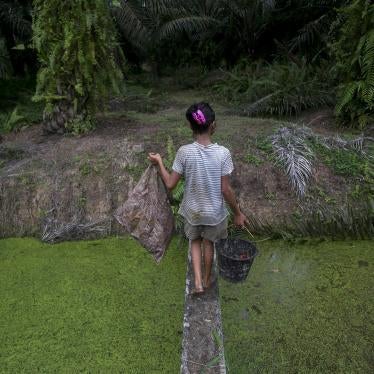(New York) - Indonesian police should strengthen efforts to find those responsible for the 2004 murder of a leading human rights lawyer instead of pursuing criminal defamation allegations against one of his fellow activists, Human Rights Watch said today. Munir bin Thalib, a renowned lawyer, was poisoned on September 7, 2004 while on a Garuda Indonesia flight from Jakarta to Amsterdam. Maj. Gen. (ret.) Muchdi Purwopranjono, a senior intelligence official, was acquitted of murder charges on December 31, 2008.
Those who orchestrated the murder remain free. But on a complaint from Muchdi, Jakarta police have begun a criminal defamation investigation against Usman Hamid, the coordinator of the Commission for Missing Persons and Victims of Violence (Kontras), for statements he allegedly made following Muchdi's acquittal. Police questioned Usman on September 9, 2009.
"Five years on, the masterminds behind Munir's murder are still free, while Munir's fellow activists continue to face intimidation," said Elaine Pearson, deputy Asia director at Human Rights Watch. "The police should focus on gathering stronger evidence to bring those who planned Munir's death to justice."
Muchdi, a former director at Indonesia's State Intelligence Agency (known as Badan Intelijen Negara or BIN) and the former head of the army's abusive special forces unit Kopassus, has reportedly alleged that Usman shouted, "murderer, murderer" during the general's trial on charges of premeditated murder.
Following Muchdi's acquittal, the roughly one thousand people attending the trial reacted with yelling and applause, depending on which side of the case they supported. Usman made a speech outside the court, criticizing the verdict. According to media accounts, he said, "Siapa pembunuh Munir? Muchdi," which means, "Who murdered Munir? Muchdi."
President Susilo Bambang Yudhoyono has said that finding Munir's killers was "the test of our history." Usman was a member of an independent fact-finding team established by Yudhoyono in December 2004 to conduct investigations into the killing. In May 2005, Yudhoyono ordered three ministers to investigate several suspects at Garuda Indonesia and the State Intelligence Agency.
Two persons were convicted for the murder - an off-duty Garuda pilot, Pollycarpus Budihari Priyanto, sentenced to 20 years of imprisonment, and the former Garuda chief executive officer, Indra Setiawan, sentenced to one year. But they are believed to be minor figures in the killing. The fact-finding team examined Pollycarpus's mobile-phone records and traced several dialed numbers, one of which was a confidential line to the intelligence branch directed by Muchdi, a deputy director of the State Intelligence Body. Records reportedly show that as many as 41 calls were made to Muchdi's line, before and after Munir's death, and that there had been multiple calls between Pollycarpus's and Muchdi's personal mobile numbers.
Based on the evidence of the fact-finding team and a reinvigorated police investigation, Muchdi was brought to trial in August 2008 at the South Jakarta district court, but then acquitted. Human Rights Watch said the evidence presented during the Muchdi trial was compelling, but the prosecution was hampered by the systematic retraction of sworn statements to the police and pressure put on the court by groups present in the courtroom. Witnesses withdrew statements they had made to the police, claiming to have forgotten basic facts, or failed to appear in court. Most were former or current intelligence officers or retired members of the military.
Several witnesses contradicted their statements to investigators, claiming that they did not know or remember the answers to questions they had answered in detail previously. However, in courtroom testimony, police investigators rebutted claims by some of these witnesses that they had been sick, under psychological pressure, unable to see without their glasses, or deprived of representation when they were initially questioned.
Human Rights Watch called for an independent investigation into witness tampering and said that witness-protection efforts should be strengthened.
"There is compelling evidence that witnesses in the Muchdi trial changed their stories or left things unsaid because they were too scared to speak out in the courtroom," said Pearson. "The police have no excuse not to continue their work on this case."
On June 15, 2009, the Indonesian Supreme Court rejected an appeal by state prosecutors of Muchdi's acquittal. Munir's colleagues at Kontras and Imparsial, another human rights organization, have continued to share information on the case with the attorney general's office.
Usman was previously accused of criminal defamation by senior military officers sought for questioning in Munir's murder. In May 2005, after the fact-finding team issued a summons to a retired army officer, Lieut. Gen. A.M. Hendropriyono, head of Indonesia's State Intelligence Agency at the time of the murder, he accused the team of "arrogance" and "character assassination." Hendropriyono subsequently filed criminal defamation charges against two members of the fact-finding team, Usman Hamid and the head of Imparsial, Rachland Nashidik.
The case was eventually dropped, after Hendropriyono succeeded in avoiding a meeting with the fact-finding team.
Human Rights Watch renewed its call to repeal criminal defamation laws, which violate the internationally recognized right to freedom of expression.
"Criminal defamation laws have a chilling effect on free speech and have often been used to silence political opponents in Indonesia," said Pearson. "It's sad to say those times aren't past, but it shows the need for the government to repeal these laws to safeguard the right to free expression."






